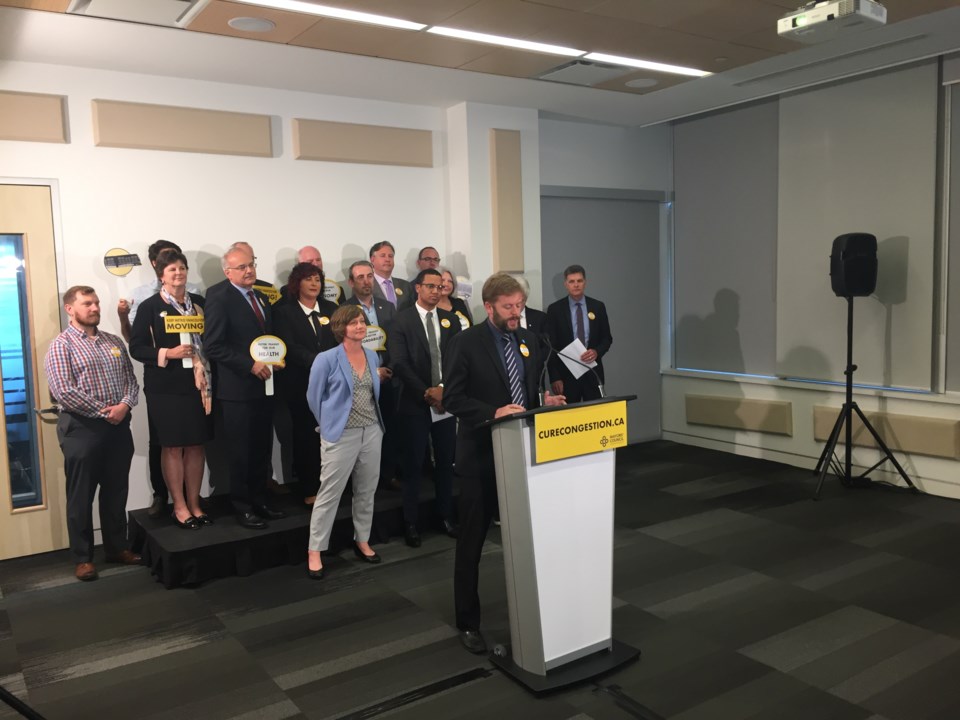The Mayors’ Council on Regional Transportation is calling on voters to play a role in curing congestion in Metro Vancouver.
In the months leading up to October’s federal election, the Mayor’s Council is urging all major parties to commit to curing congestion by creating a Congestion Relief Fund, which would provide funding for sustainable investments in public transit, roads, bridges and active transportation.
“Our message is very clear and straightforward. We in this region need permanent, predictable funding for public transit so we can help cure congestion and keep Metro Vancouver moving,” said Mayor Jonathan Cote, chair of the Mayors’ Council. “The fact is, our region has been experiencing tremendous growth, and that growth is expected to continue.”
Cote said the Mayors Council launched the Cure Congestion campaign in April and is now launching the next phase of the campaign, which seeks to engage Metro Vancouver voters and residents in sending a message to federal officials about the importance of predictable, stable funding for public transit. He said the Cure Congestion campaign won’t be fully successful unless Metro Vancouver residents engage in it and provide feedback to federal parties.
“We need residents to be able to tell the story and make the call for better transit in the Metro Vancouver region. By using a simple email tool that we will be launching today, all residents in Metro Vancouver will be able to directly communicate and help support the cure congestion campaign,” he said. “Together we can make a difference.”
At a May 23 press conference held to launch new voter engagement tools at www.curecongestion.ca and a new video advertisement on social media, representatives of a number of Lower Mainland organizations joined members of the Mayors’ Council to support the initiative, including the Better Transit and Transportation Coalition, Simon Fraser University, UBC and Hub Cycling.
“With campuses in Burnaby, Surrey and Vancouver, having a dependable and efficient transportation system that works for everyone is vital for Simon Fraser University and the communities we serve,” SFU president Andrew Petter said in a statement. “Further stable federal investments in transportation infrastructure, as contemplated by the Mayors’ 10-year vision, are needed to ensure that we continue to develop the transportation system this growing region so badly needs.”
Cote said funding is in place up until 2027 for Phase 2 of the TransLink’s 10-year investment plan, but there’s no secured funding beyond that time for Phase 3 or beyond. He said a whole host of projects planned for the region are reliant on federal funding.
“That is why we are here today to call for a predictable congestion relief fund. With our population continuing to grow and demand for transit on the rise, we need the federal government to stay on board,” he said. “I think we need to make it clear that we are not asking for additional funding – what we are asking for from the federal parties is that they make commitments to continue the existing funding that has traditionally been in place but do it in a way that is predictable and stable so that our region can make long-term planning.”
Cote was part of a delegation of Metro Vancouver politicians and TransLink officials who visited Ottawa in April for Transit Day on the Hill. They met with 26 members of Parliament from all parties to inform them of the Cure Congestion campaign and to discuss the investments that have been made in public transit.
“This campaign isn’t about trying to get voters to support one political party or another, it’s about trying to raise this profile of transportation and make sure all political parties understand the importance of making commitments,” Cote said.



